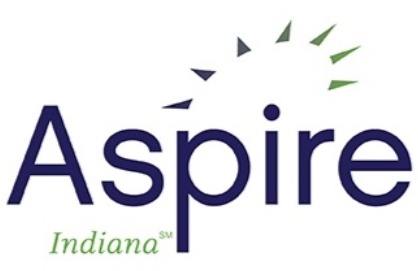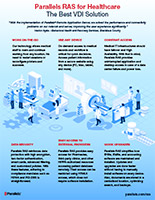Infographic
Parallels RAS for Healthcare
View the benefits of using Parallels RAS as an application delivery and virtual desktop infrastructure (VDI) solution for the healthcare sector.
PARALLELS RAS FOR INDUSTRIES
Healthcare practitioners require increased mobility in today’s world. VDI delivers that mobility, while ensuring the access security to centralized medical data. With a VDI infrastructure, it’s straightforward for IT administrators to back up data, perform data recovery, and update malware and antivirus protection, by leveraging a complete suite of security features.
VDI makes it possible to access patient data and information from any device at any location. This is hugely beneficial for those in the healthcare industry, as it impacts how patients are treated in real time. For example, a hospital that leverages VDI technology can input critical information about a trauma case that just arrived so that a surgeon can review it from a mobile or tablet while walking to the emergency room.
Doctors and nurses are always on the go—jumping between patient rooms, labs and offsite meetings. As such, they require secure access to critical patient data from multiple devices, including mobiles and tablets. VDI enables healthcare professionals to access data and applications wherever they are, through single sign-on. This saves time by eliminating the need to log into various systems.
Provisioning desktops is simple with VDI technology, as each system does not have to be manually configured. It’s both straightforward and near instantaneous for IT administrators to create virtual desktops to meet user demands. This makes it seamless for healthcare facilities to save time and costs when onboarding new employees.
Setting up physical desktops for all employees within your healthcare organization can be time-consuming and expensive. On the other hand, with a virtual desktop infrastructure, desktops and applications can be accessed from any device, including personal devices, dramatically reducing hardware provisioning costs.
HIPAA compliance and other regulations are essential for healthcare organizations. With VDI, approved staff can securely access the files they need, ensuring patient data is always protected. When implementing VDI, sensitive information is protected through end-to-end security and unauthorized parties are unable to access it.

Cancer Council NSW, an independent charity in New South Wales, implemented Parallels RAS to publish Microsoft Office applications to employees on Mac and Windows machines. Parallels RAS seamlessly connects Cancer Council NSW end users with shared applications and files, increasing productivity. It has improved the level of customer care they offer.
Read MorePhiladelphia-based Esperanza Health Center upgraded to Parallels RAS to enhance their electronic medical records (EMR) application publishing solution based on Microsoft RDS. After deciding that their virtualization solution wasn’t performing adequately, the IT director decided to utilize Parallels RAS. Now the Esperanza Health Center has instant access to EMR applications from any device, anywhere.
Read More
Parallels RAS allowed Aspire Indiana, a nonprofit community mental health center, to deliver secure, remote access to EMR applications through an HTML5 gateway. Aspire Indiana was also impressed by the overall simplicity and user-friendly virtualization features offered by Parallels RAS.
Read MoreCalifornia-based KernBHRS, a public mental health clinic, decided to implement Parallels RAS after having problems with Citrix. Switching to Parallels RAS gave KernBHRS access to comprehensive features such as server load balancing, network load balancing and application publishing. The IT team was impressed by how fast it was to implement and learn to manage the “powerful set of virtualization tools” through Parallels RAS.
Read MoreBased in Florida, Bay Dermatology and Cosmetic Surgery needed to improve their IT infrastructure, which was performing poorly for end users. The complexity of Citrix did not allow Bay Dermatology to benefit fully from the advantages of a virtual environment. Parallels RAS delivered a superior Cloud Connectivity Platform that is easy to manage, affordable and provides more tools and scalability.
Read More
View the benefits of using Parallels RAS as an application delivery and virtual desktop infrastructure (VDI) solution for the healthcare sector.
Parallels RAS provides medical staff with reliable access to their applications and files anytime. Praxis EMR, HER software, Lorenzo PRS and imaging viewers are accessible from anywhere. Full redundancy can be implemented via supported reference architectures, reducing the risk of downtime while providing a seamless end-user experience.
Replace paperwork with a secure and straightforward medical IT system that enables healthcare organizations to securely access EMRs from any device and any location. Parallels RAS reinforces security by centralizing and managing data access. With features such as two-factor authentication, advanced filtering, and customized policies, adhering to compliance mandates such as HIPAA and PCI-DSS is easier.
Single sign-on (SSO) facilitates faster login times by streamlining the management of user identities from different organizations — without sharing the local identity database. By leveraging artificial intelligence (AI), Parallels RAS makes applications ready to use when needed, increasing efficiency. Medical staff don’t have to wait for their virtual desktops to be created at the start of their day and instead can get working faster.
With Parallels RAS, admins can manage the IT infrastructure from a single console. IT staff can perform all the available tasks, such as deploying servers, publishing applications and desktops, monitoring resources, managing connected devices, providing helpdesk assistance and defining security policies.
Medical IT infrastructures can be scaled up or down with auto-provisioning and auto-scaling capabilities. Parallels RAS can dynamically create, remove, release and load balance Windows Servers based on predefined criteria. This enables healthcare providers to spend less time on technical aspects of the system and focus on providing better healthcare.
Ready out of the box and easy to use, Parallels RAS Universal Printing increases printing performance and response time when clinicians use local printers with server-based desktops or virtual applications. Medical staff can print directly to their local printers without having to install local printer drivers.
Experience seamless Virtual Desktop Infrastructure for healthcare.
Try now